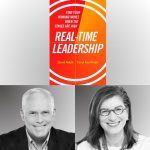Podcast Themes
Multiple perspectives on a topic that you are curious about!

Alan speaks about how Bill would go about engaging with leaders and ensuring that they made good decisions. There is a piece here around following the right process for making a good decision. He also speaks about his role in helping leaders move on once a decision is made (whether it is in your favour or not).

Carol and David speak about how we can adopt multiple approaches to a situation. They borrow from the notion of fight, flight, fright or befriend and talk about the different approaches leaders could take to a situation – Lean in, Lean back, Don’t lean at all and Lean with.

Carol and David speak about Validating the vantage point that a leader has. They speak about the various elements of a vantage point – resolution, level of detail , biases, near term vs long term and more.

Jeffrey speaks about how being judgmental comes in the way of learning and can drive people away from us. He speaks about how Steve Jobs, Donald Trump and Elon Musk wielded power but as a result had a lot of attrition around them. He also speaks about how we may not have the right to tell somebody else what they ought to do but we possibly have a right or an obligation to tell others how they can get better at doing something.

Jeffrey speaks about how nuclear energy can be a boon if used to generate electricity but could be a bane if it is used to make a bomb that kills people. Jeffrey goes on to say that context determines if something is good or bad and says that Power works in a similar fashion.

Ethan speaks about how we could be effective in helping people deal with Chatter. He suggests that while we need to play a role of empathizing and listening to allow the person to vent, we also need to consider providing some coaching or widening of their perspective so that they could move forward. He speaks about the few people that he calls Chatter Advisors that he turns to where he gets a healthy balance of listening and Sounding Board support when he experiences Chatter. He speaks about some of the characteristics that leads them to be on his Speed Dial.

Manjari speaks about some of the situations at work where she had to balance the multiple egos and agendas and find an approach that’s tactful. She also goes on to talk about her black and white approach to situations and how she cuts through the clutter.

Raghu speaks about the notion of resolving Dharmasankatas – the double bind situations where there are no easy answers. He speaks about how Indian leadership (going back to King Vikramaditya) has had an emphasis of resolving Dharmasankatas. He goes on to speak about the Leadership traits that help in resolving these tricky situations.

Raghu makes an interesting observation. He says that while Bhagwad Gita was a discussion between Krishna and Arjuna on the various dilemmas the latter was facing, it could have well been a conversation between Krishna and Karna. He says that Karna was so consumed by his hurt that he never even saw the dilemma and that was a missed opportunity. He connects this to several people and communities that might be going through a similar phenomenon.

Dan speaks about the work of Barry Schwartz around regret and teases out the distinction between regret and FOMO (Fear of missing out). He also speaks about how we call can undertake “time travel” to ensure that the “me of 10 years from now” would minimize regret.

Pradeep speaks about how some of the kings assembled the right council of advisors around them to help them through complex situations. He refers to Malik Ambar, Ahilyabai, Serfoji and Aurangzeb in how they thought about getting advice from experts.

Ayse speaks about how we can equip our children to design their life as they set sail on their respective journeys in a world filled with twists and turns. We connect the dots with an insight from Pramath Sinha on how we can help equip children to navigate the world of uncertainty.